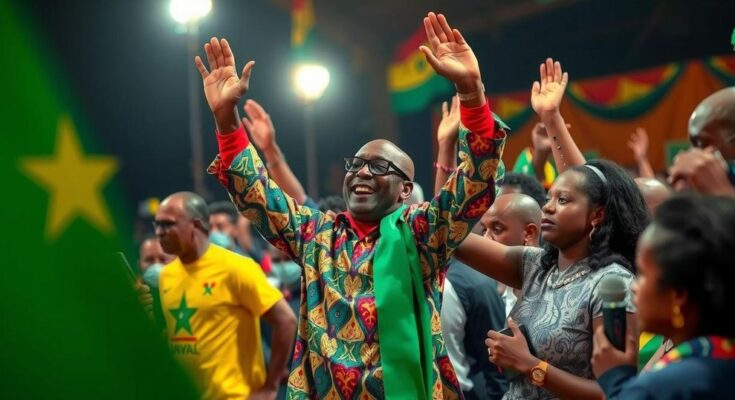Senegal’s ruling PASTEF party has claimed a decisive victory in the recent legislative elections, following President Bassirou Diomaye Faye’s earlier presidential win. Opposition parties conceded defeat, while allegations of electoral fraud from former President Macky Sall arose without detailed evidence. The victory positions Faye to address several key reforms, despite challenges from economic conditions and public dissatisfaction.
Senegal’s ruling party, PASTEF, has declared a significant victory in the recent legislative elections held on Sunday, following the near-completion of the ballot count. This victory follows President Bassirou Diomaye Faye’s earlier success in the presidential election, allowing him to pursue an ambitious reform agenda. Government spokesman Amadou Moustapha Ndieck Sarre expressed gratitude to the Senegalese populace for their support, attributing the electoral success to PASTEF’s commitment to the voters. Despite ongoing vote counting, leaders of the two primary opposition parties conceded defeat. Barthelemy Dias, head of the SAMM Sa Kaddu coalition, publicly congratulated PASTEF, signifying a peaceful transition of power. Former President Macky Sall, leading an opposition group from abroad, alleged widespread electoral fraud orchestrated by PASTEF, although he provided no specific evidence to support these claims. The newly elected President Faye, who took office in April, had previously faced challenges in implementing his agenda due to a lack of parliamentary majority. With PASTEF’s triumph in the legislative elections, Faye is now positioned to advance his goals, such as combating corruption and improving resource distribution for the citizens. The legislative campaign experienced minimal violence, despite notable tensions between supporters of rival parties. Nonetheless, the opposition has criticized the new administration for perceived inaction and mismanagement, especially considering Senegal’s high unemployment rate exceeding 20%. In response to public grievances, the government has attempted to lower the costs of essential goods, a move that risks increasing the national budget deficit, which has been reported as more severe than previously indicated. The International Monetary Fund has suspended its aid program amid these financial concerns.
The situation in Senegal has become increasingly dynamic since President Bassirou Diomaye Faye was inaugurated. His administration inherited a legislative landscape heavily influenced by the opposition, necessitating significant political maneuvering. With a public increasingly dissatisfied with economic conditions, including notable unemployment rates, the new government faces pressures to fulfill electoral promises while navigating complex relationships with opposition figures. This election marked a pivotal point for the ruling party, allowing it a chance to regain control of legislative processes and move forward with its reform initiatives.
In conclusion, the electoral victory of Senegal’s ruling PASTEF party represents a crucial step for President Faye in implementing his reform agenda. Although the opposition has raised accusations of electoral mishandling, there appears to be a collective acceptance of the results among key opposition leaders. As the new administration confronts pressing economic challenges, its ability to push through legislative proposals will largely determine its success moving forward.
Original Source: www.dw.com




